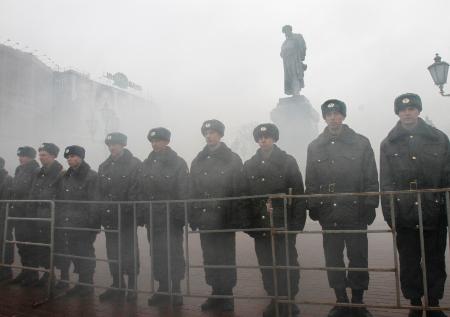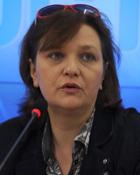|
Russians are becoming increasingly active in the country’s social arena. While activists remain a small but growing and visible minority of citizens looking for changes in governance, many more are becoming involved in the day-to-day affairs of their communities. It remains to be seen whether this emerging culture of civic participation will sit comfortably with existing governance structures.
Saying that 2012 was a turbulent year for Russian society would be a great understatement. The year started with unprecedented and largely unexpected protests against alleged electoral fraud at the December 2011 State Duma elections. In March, the civic supervision of presidential elections–where I spent 24 hours at a polling station as an official elections monitoring expert–was even more extraordinary.
Protests against alleged electoral fraud erupted on the streets of Moscow, Saint Petersburg and almost all other major Russian cities. These led to clashes with police in Moscow’s Bolotnaya Square on 6 May over the arrest of protest leaders, and then to the adoption of new restrictions on non-profit organisations that receive funds from foreign sources, the so-called “Foreign Agents Law”. Demonstrators also protested against amendments to laws governing public events, anti-extremism on the Internet, libel and high treason.
The trial of the all-girl punk group Pussy Riot made world headlines, as did the street rallies that both condemned and supported them. Demonstrations in favour of the ruling party and pickets in support of those detained at previous public events abounded. Indeed, 2012 was packed with more civic activism than any other year in recent Russian history.
Society demanded change and the authorities responded in a way they considered appropriate, by requesting civil stability. But many fiercely argued that stability equalled stagnation. Civic activists spoke up against the corrupt elite, illicit property and the excessive wealth of many high-ranking officials. The authorities responded by accusing activists of anti-patriotic behaviour, and attempting to hijack the anti-corruption agenda for political self-promotion.
Protestors continued to discuss the issues that were most pressing to them: state-supported economic projects, public budget allocations, government expenditure and oversight, and the social protection system targeting the underprivileged, most notably children. Soon the civic activists who expected their protests to translate into major social change early in the year began to grow pessimistic and upset that little seemed to change. The government assured the public that it was undertaking an active and hard-hitting war against corruption and in favour of traditional national values, but this failed to improve relations with an angry populace.
Experts on Russian governance and social issues point out that the many types of systemic corruption in Russia– ranging from common bribery to corrupt conflicts of interest at the very top of the governance structure–have created a crisis of social trust. Experts and opinion polls suggest that the Russian people place little trust in police officers and law enforcement in general. And because the authorities do not trust their own citizens, electoral procedures are kept under tight control, as are the budget and government appointments.
It is difficult to convince people that another round of anti-corruption reforms will yield more than previous ones did–that is to say, very little. This is ironic, because the anti-corruption laws and regulations passed between 2008 and 2012 were indeed a major step forward and will inevitably play a positive role in the country’s future. But there is a significant gap between writing a law and enforcing it. The impunity of elites and a lack of open social dialogue have only added to this crisis of trust, and many observers conclude that any reform aimed at transparency and public accountability in Russia is doomed.
I do not share this conclusion. Instead, I believe that there is an important part of Russian society that can make a di¤erence both in the concrete task of increasing accountability and in achieving the more general goal of restoring trust. In the last two to three years we have seen a great deal of action by grassroots movements and growing societal activism in community life, philanthropy, ecology and social protection. The projects and activities they pursue have never been in any way political; they are aimed at concrete tasks seeking concrete results.

Ordinary citizens–teachers, students, entrepreneurs, managers and office clerks who never participated in any type of organised activism–picked up important agendas and worked to make people’s lives better. They supported clinics and orphanages, monitored ecological progress, protected historic buildings from illegal demolition, and much more. From these efforts, even though they were invisible to much of the nation and of little interest to the country’s media, new roots of mutual trust began to emerge. Those roots connected people and produced the beginnings of a real Russian civic society.
Eventually these groups started to become vocal, demanding more transparency from public bodies and fairer elections. But they were dramatically different from any type of social protest Russia had seen before. The new civic activists not only demanded change, but became directly involved in Russia’s most challenging problems. Some of them joined local councils and took up plans to build new roads and kindergartens; some created an independent system to monitor public procurement; others supported hospices and monitored the behaviour of the traffic police.
Civic control in Russia is now booming. It started in 2012, when a significant share of the country’s citizens finally realised that change for the better never comes from outside society, but from citizens themselves. Many realised that in a country plagued with corruption, it is unreasonable to expect officials and authorities to single-handedly lead the fight for transparency and accountability. They saw a need for direct involvement by informed citizens in the details of public life and the public governance system at large. And they realized that they do have someone in whom they can place their trust–their fellow citizens.
It is clear that the growth in civic consciousness, social participation and public engagement will not be fast or easy. To complicate matters, parts of the government do not see this as a positive trend. This may be because they have no previous experience working alongside civic activists and are scared of doing so. One thing is certain: it will require much time and effort to convince the historically egocentric Russian state that a new civic order is dawning, and that public trust and social change are not born of a rigid vertical power structure, but a horizontal one emerging from within Russian society.
References and recommended sources
Transparency International Russia
OECD work on Public Governance
OECD work on Russian Federation
OECD Forum 2013 Issues
More OECD Observer articles on Russia
Subscribe to the OECD Observer including the OECD Yearbook
|
|

By Elena Panfilova, Director, Center for Anti-corruption Research and Initiative, Transparency International Russia
©OECD Yearbook 2013

|


